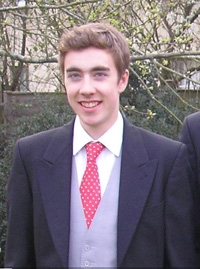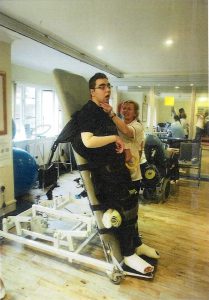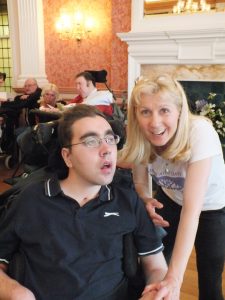empowering the severely brain injured and their families via support, understanding and a network of care
Stories
Peter’s Story by Anne
In November 2007 Peter was a model third year student at St John’s College, Durham University where he was on course for a first class honours degree, captained the college boat club, represented the university at cross country and inspired the love of all who knew him.  On the morning of 21stNovember 2007 we received a call from the Durham police notifying us that Peter had been found in the street unconscious with head injuries. He had been out with friends the previous evening and was seen walking home, but never made it back. Suspiciously, he was not found on his route home but some 80 metres past his house, around two corners and down a side pathway. The likelihood was that Peter had been outside in the cold and rain for six or seven hours before being found by a passing milkman.
On the morning of 21stNovember 2007 we received a call from the Durham police notifying us that Peter had been found in the street unconscious with head injuries. He had been out with friends the previous evening and was seen walking home, but never made it back. Suspiciously, he was not found on his route home but some 80 metres past his house, around two corners and down a side pathway. The likelihood was that Peter had been outside in the cold and rain for six or seven hours before being found by a passing milkman.
We left work, went home and threw some things together before driving north. Initially, we were heading for Durham but when the hospital there recognised the extent of Peter’s injuries he was sent on to Newcastle General Hospital. Peter’s paternal grandparents lived not far from him in the north east so they were quickly able to follow. They telephoned us with progress reports as we drove and we went directly to Newcastle. By the time we arrived in the afternoon we knew that Peter had sustained a traumatic brain injury and that he had undergone two major brain operations, the first to remove blood clots and a second involving the removal of a bone flap to relieve swelling and prevent further damage to the brain within the skull. Pete remained in a critical condition and his younger brother was travelling as fast as possible from Bristol University, arriving in Newcastle that evening.
Peter spent two and a half weeks in intensive care when his life hung in the balance. We very nearly lost him on more than one occasion and this period was a sort of living hell for us all, particularly Peter. He then spent three weeks in a high dependency unit before several weeks on a general neurological ward. We spent that time in intensive care watching both Peter and the monitor screens for any signs of distress, especially the signal showing the pressure around the brain. Pete was heavily sedated and in an induced coma. He did not fully regain consciousness, although his eyes were open and retained a certain degree of physical movement. He was unable to speak and showed limited awareness of his surroundings. Peter had been given a tracheostomy and was initially fed using a nasal tube, later being fitted with a peg feeding tube. One of the common side effects of brain injury is that patients have difficulty in controlling their temperature and from the beginning Pete had to be helped in this regard, using codeine, cooling bed baths and even an ice blanket & cold air fans. In time his body recovered the ability to control its temperature. Peter had also been fitted with a catheter at first. This was essential at the time but caused endless urine infections until he was able to change to a conveen some months later after moving to Putney in February 2008.
In order to control further swelling caused again by cerebrospinal fluid build up around the brain surgeons had to operate once more in December 2007 to fit an external burr-hole shunt to drain excess fluid. This proved successful and was removed after a few days. Without it the excess fluid was causing displacement of the brain and the potential for further damage within the skull. During this time Peter had several CT and MRI scans to monitor any changes to his brain.
On the 6th January 2008 we saw our first definitive response from Pete, who held his Mum’s hand and later let go on instruction. The staff at Newcastle General were outstanding in their devotion and their care was inspirational. The incredibly heart-warming support of friends and family, young and old, in this period was invaluable and sustained us through the emotional turmoil of those early weeks.
Peter’s condition stabilised a little and he was deemed well enough to be able to travel nearer to our home in the south. Since November we had remained at his bedside, initially staying in accommodation at Newcastle General and then with Peter’s grandparents a few miles away. His girlfriend and her family had travelled to be with us and remained in Newcastle for several weeks until the New Year, as did Pete’s brother.
On 21st February 2008 Peter moved to the Royal Hospital for Neuro-disability in Putney, which is only about five miles from our home. The journey by ambulance was long & traumatic, obviously very stressful for Pete. It took some time for him and us to settle into the new environment. Here he underwent a series of tests as efforts were made to stimulate his recovery but progress was slow, largely due to the frequency of chest and urinary infections throughout 2008. These caused several stays at both Kingston Hospital and St George’s Hospital, Tooting for ailments including tonsillitis and pneumonia. At Putney concerns were raised regarding the build up of fluid once again around Peter’s brain and in March Peter was fitted with an internal VP shunt to control the dispersal of cerebrospinal fluid at the Atkinson Morley wing of St George’s Hospital.
In May 2008 Peter spent a few days at Addenbrooke’s Hospital in Cambridge being tested to try to establish his levels of brain activity and responses to various stimuli. This gave us further confidence that although Pete’s brain is badly damaged the basic functions of sight and hearing seemed to be intact. Neurosurgeons at Addenbrooke’s also expressed the opinion that Pete should have a plate fitted as soon as possible to allow the brain to re-align itself as it was being pushed slightly to one side by external pressure on the skin flap where the skull was missing.
In July 2008, at St George’s, Tooting he had cranioplasty, fitting a titanium plate to replace the missing skull bone. His hair grows perfectly normally over the plate and this operation successfully returned Pete to a virtually normal physical appearance which offered great reassurance and comfort to us all. It allows the recovering brain to settle into a natural position within the skull and offers genuine protection. During the months around these various surgical procedures Peter continued to undergo numerous CT and MRI scans. At all stages it was immensely difficult to see Pete going through such a tough time but also inspirational to see his fighting spirit and to feel the support of so many friends. It was at Putney that we met a wonderful group of people, five of whom have founded this site, and who we hope will remain friends forever.
We strove to get Peter to respond to stimuli and achieve some consistency in his movement and responses. We have been with him for as many hours each day as visiting times allow and he is still visited frequently by friends and family. Every day Peter spends 6-7 hours up in his wheelchair and the movement and variety which this brings is important in sensory stimulation, for physical & postural flexibility and in the management of a clear chest. Pete undergoes regular physiotherapy and enjoys reflexology and other treatments. We are able to spend time outside with Pete in his chair and he loves the outdoors. We also have an adapted car which enables us to travel with Pete, making visits to our home and spending time with friends possible.
After an unsettled 2008 Peter established a more sustained period of stability in 2009, remaining infection free for the whole year. Getting rid of the catheter was one key to this progress. An ongoing problem remained his difficulty in controlling his swallowing facility and in coping with excess saliva. This is a common by product of head injury. Only with sustained stability can progress be made. At this stage Peter is still unable to take food or drink by mouth. His responses to instruction have improved slowly, so we know that he can hear and understand to a certain degree and he retains a limited amount of physical movement, which he is working on with characteristic determination and resolve. It is imperative to maintain the physical and mental stimulation as far as the patient’s stamina will allow
Peter has continued to inch forward and each little bit of progress has been hard work. In January 2012 he had his feet operated on at St Georges Hospital, Tooting to return his feet to a natural angle/position and enable him to stand (with support) and sit more comfortably with his feet planted squarely on the ground. This has allowed him to exercise more consistently in the gym both standing and cycling which has helped improve his all round strength and well being and retained a degree of flexibility.
The continuing support of family and friends has been invaluable and immensely appreciated by us all. Thank you so much.
Peter will not lack love and support in his fight to improve his quality of life and we shall leave no stone unturned in that fight. There is nothing we can do which can ever repay him for the joy he has brought us.
Following Peter’s feet op on 11th Jan 2012 he was able to have the casts removed on 23rd Feb. By 31st March he was able to stand, using a tilt table, for up to 50 minutes. By November 2012 he was able to stand fully upright, without the tilt table but with support.
 It was great to see him standing 6ft tall again. He continues with regular standing, sitting, balancing and stretching exercises in the gym. In March 2013 he got his own cycling machine, which enables him to exercise even when the gym is closed at weekends or Bank Holidays. The ability to stay upright and exercise has helped Pete enormously.
It was great to see him standing 6ft tall again. He continues with regular standing, sitting, balancing and stretching exercises in the gym. In March 2013 he got his own cycling machine, which enables him to exercise even when the gym is closed at weekends or Bank Holidays. The ability to stay upright and exercise has helped Pete enormously.
The earlier troubles he had with controlling the production of saliva are largely now resolved. His main difficulty is in the clearance of mucus from the upper respiratory area. He often has a degree of congestion, which is frustrating for him, and which is tiring to clear. He has had one or two infections (usually chest) which have caused brief stays in hospital, but these occur only about once a year.
One of the most important pieces of equipment which we have been able to provide for Peter is an air conditioning unit for his room. This has meant that it’s never too hot there, even in summer. This has been invaluable during very hot & humid weather.
In the past couple of years we have marked one or two important events. Out of the blue in 2015 Peter was awarded his degree by Durham University. Pete was injured in his final year as an undergraduate whilst reading Ancient, Medieval & Modern History. As Pete was unable to go to Durham his college principal generously travelled to London to present the degree in front of eighty friends and family at Pete’s old school, King’s College School, Wimbledon. Thank you to everyone at Durham University and KCS who made it possible.
In 2017 Peter’s old college boat club, St. John’s, named one of their VIII boats the “Peter Wake”. It now proudly represents the college at regattas nationwide and we continue to follow the fortunes of the boat club throughout the year.
In the summer of 2017 we celebrated Peter’s 30th birthday with a garden party at home. At the time of his birthday in May Peter was in hospital with a lung infection, so the party took place on a sunny Sunday afternoon in June.
Peter has had a difficult last year or so with a number of stays in hospital, mainly at Kingston, with pneumonia or lung infections. He has battled each one with great determination and we look forward to a period of renewed stability in the year ahead. Chest infections can be an occupational hazard for the brain injured and ongoing physio, exercise and a regime of nebulisers when necessary is central to keeping them at bay. Nonetheless, 10 years on, Peter continues to make progress. His understanding and responses are quickening and he plays happily with a tennis ball in his left hand.
Key to Pete’s progress has been the various therapies which he enjoys. Physio, speech & language, aromatherapy and musical therapy have all been useful. Peter enjoys being read to (newspapers & books) and listens to music (classical & popular). He enjoys the company of friends & family and the great outdoors. We still follow his passion for sport by discussion, watching & listening. He has sufficient use of his left hand to play with a tennis ball. Pete is unable to speak but he listens attentively at times and will respond by squeezing a hand. By this method he is even able to have a stab at quiz questions, which is fun. He is also able to raise his left hand as a “yes” response. These therapeutic activities are thanks to the staff, volunteers, family & friends who provide them, so it’s a real team effort. With all of these exercises Peter has a busy schedule and consequently is generally able to sleep well at night.
Pete’s friends have been tremendously loyal and their input & support has been essential to his progress, for which the family is eternally grateful.
17/05/1987 – 21/06/2018
 Peter was a beloved son to Anne and Phil and brother to Christopher. No young man could have been more loved and he is remembered with immense love and affection by family and friends alike. He was a determined character, achieving all his goals as life unfolded. He excelled academically and at sports and enjoyed the deep friendships that school and university can bring. No parents could have a finer son. He was intelligent, warm and loving and had a wonderful, infectious sense of humour.
Peter was a beloved son to Anne and Phil and brother to Christopher. No young man could have been more loved and he is remembered with immense love and affection by family and friends alike. He was a determined character, achieving all his goals as life unfolded. He excelled academically and at sports and enjoyed the deep friendships that school and university can bring. No parents could have a finer son. He was intelligent, warm and loving and had a wonderful, infectious sense of humour.
After Peter was injured at the age of 20 we all felt that there was nothing we could do for him that was too much. We could never repay him for the joy he brought us. We would urge the relatives of the brain injured to fight hard on behalf of their loved one – you are their main advocates and supporters.
Peter died aged 31 following one too many chest infections and associated complications. He fought hard with typical grit and resolution to the end.
God bless you, Pete. Rest in peace.



